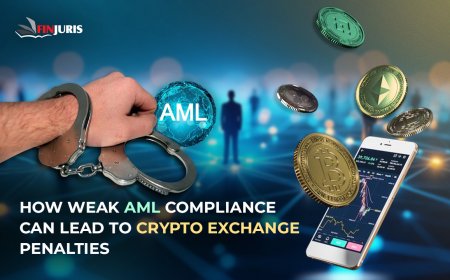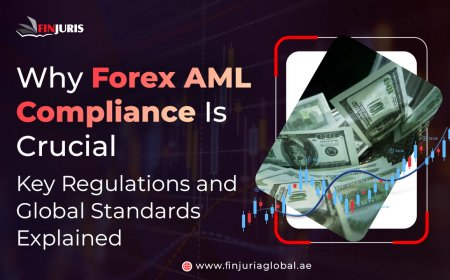Top Reasons to Hire AML Lawyers for Your Fintech Business
Discover why hiring AML lawyers for fintech businesses is vital. Stay compliant, win investor trust, and scale globally with expert legal guidance.

The fintech revolution is global. From digital payments in Africa, to challenger banks in Europe, to crypto exchanges in Asia, fintech startups are transforming how people interact with money. But with innovation comes responsibility — and regulators worldwide are watching closely.
One of the most pressing obligations for fintech founders today is compliance with anti-money laundering (AML) regulations. Financial crime is a top concern for governments, and fintechs are a natural target due to their speed, digital-first nature, and borderless products.
This is why hiring AML lawyers for fintech business has become critical. Whether you are launching a neobank in London, a payments platform in Dubai, or a crypto exchange in Singapore, AML compliance is central to scaling safely and sustainably.
Why AML Compliance Matters Globally
Money laundering is a borderless crime. Regulators across jurisdictions have set up frameworks to prevent fintechs from becoming gateways for illicit money flows:
-
United States – Fintechs fall under the Bank Secrecy Act (BSA) and must register with FinCEN (Financial Crimes Enforcement Network).
-
European Union – Fintechs must follow the EU’s Anti-Money Laundering Directives (AMLD 4, 5, 6) and upcoming AMLA centralized authority.
-
United Kingdom – Regulated by the Financial Conduct Authority (FCA), with stringent AML/CTF rules for payments and crypto businesses.
-
Singapore – The Monetary Authority of Singapore (MAS) enforces AML laws under the Payment Services Act.
-
Dubai – The Dubai Financial Services Authority (DFSA) and VARA (for virtual assets) regulate AML in the DIFC and free zones.
-
Global Standards – The Financial Action Task Force (FATF) sets international AML benchmarks, which most countries align with.
For fintech startups, compliance failures don’t just mean fines — they can lead to license revocations, frozen accounts, loss of banking partners, and reputational collapse.
What AML Lawyers Do for Fintech Businesses
An AML lawyer is not just a legal advisor; they are a bridge between law, technology, and operations. Their role typically includes:
-
Regulatory Mapping – Identifying which AML rules apply to your fintech across all jurisdictions of operation.
-
Policy Development – Drafting AML/CTF manuals, KYC onboarding procedures, and suspicious activity reporting processes.
-
Governance Setup – Designing internal roles such as Money Laundering Reporting Officer (MLRO) and compliance committees.
-
Technology Guidance – Advising on RegTech tools, KYC vendors, screening systems, and monitoring frameworks.
-
Cross-Border Compliance – Ensuring your AML program aligns with FATF standards and avoids conflicts between jurisdictions.
-
Staff Training & Awareness – Delivering practical training to embed compliance culture across teams.
-
Regulator Representation – Responding to inquiries, audits, or investigations from authorities like FCA, FinCEN, or MAS.
Top Reasons to Hire AML Lawyers for Your Fintech Business
1. Avoid Regulatory Sanctions
Fines for AML breaches have reached billions of dollars globally. Startups may not survive even a fraction of those penalties. AML lawyers help anticipate risks and build preventive frameworks.
2. Build Investor and Partner Confidence
Investors, banks, and payment processors now require strong AML programs. Legal sign-off demonstrates maturity and makes partnerships smoother.
3. Global Expansion Support
If you’re scaling across borders, AML lawyers ensure your compliance program works seamlessly in different markets without duplication or conflict.
4. Risk-Based Compliance
Every fintech business model—be it payments, lending, or crypto—faces unique risks. AML lawyers tailor controls to your sector and customer base.
5. Crisis Management
If you receive a regulator’s notice, audit request, or enforcement action, AML lawyers provide defense strategies, negotiate with authorities, and minimize business disruption.
6. Cost-Effective in the Long Run
Fixing AML gaps after regulatory action is far more expensive than building compliance correctly from the start with legal expertise.
When to Hire AML Lawyers
-
Pre-launch – While designing onboarding, transaction flows, and governance structures.
-
Fundraising – Investors now request AML documentation during due diligence.
-
New Product Launches – Adding services like crypto, BNPL, or cross-border transfers changes your compliance obligations.
-
Entering New Markets – Expansion requires adapting to foreign AML regimes.
-
Post-Regulatory Notice – Immediate legal help is essential if you receive inquiries from regulators.
Choosing the Right AML Lawyer for Your Fintech
Not all lawyers understand fintech. When hiring, prioritize:
-
Sector Experience – Prior work with neobanks, wallets, lending platforms, or exchanges.
-
Regulator Familiarity – Experience dealing with bodies like FCA, MAS, FinCEN, or DFSA.
-
Tech Awareness – Comfort with APIs, KYC providers, and RegTech integrations.
-
International Outlook – Ability to handle multi-jurisdictional compliance.
-
Flexible Pricing – Project-based + ongoing retainer models.
AML Lawyer Hiring Checklist
-
Define scope of work (risk assessment, AML policy, staff training).
-
Ask for fintech-specific references.
-
Review sample AML manuals.
-
Confirm experience with global regulators (FCA, FinCEN, MAS, etc.).
-
Ensure service-level agreements for urgent responses.
-
Discuss transparent pricing models.
Global Case Studies of AML Failures
-
Wirecard (Germany): Collapsed amid fraud and AML failures, wiping out billions.
-
BitMEX (U.S.): Paid $100M in penalties for failing to maintain proper AML controls.
-
N26 (Europe): Fined by regulators for weak AML monitoring systems.
Each of these cases shows that even well-funded fintechs cannot afford to neglect AML compliance.
Costs of Hiring AML Lawyers Globally
-
Policy Setup Packages: Often charged at fixed fees for startups.
-
Monthly Retainers: Cover advisory, compliance updates, and regulatory interactions.
-
Incident Response: Premium hourly rates for handling enforcement actions.
In every case, the cost of hiring AML lawyers for fintech business is significantly lower than the cost of non-compliance.
Common Misconceptions
Myth: AML is just for banks.
Truth: All fintechs handling funds, data, or assets are subject to AML rules.
Myth: AML software replaces legal expertise.
Truth: RegTech automates processes, but lawyers ensure programs are legally defensible.
Myth: Compliance stifles growth.
Truth: Properly designed AML frameworks enable faster scaling, smoother licensing, and investor trust.
Final Thoughts
Fintech founders often focus on product, funding, and growth. But without a solid AML foundation, even the most innovative startup risks collapse.
Hiring AML lawyers for fintech business ensures your company is compliant across jurisdictions, builds investor and partner confidence, and creates a scalable structure for global growth.
Think of AML lawyers not as a cost, but as growth enablers. With their guidance, your fintech can innovate boldly, expand globally, and stay resilient in the face of regulatory scrutiny.
FAQ
Q1: Why do fintech startups need AML lawyers?
To comply with global AML regulations, prevent fines, and build investor trust. AML lawyers design policies, advise on technology, and represent you with regulators.
Q2: Can AML lawyers help with cross-border fintech expansion?
Yes. AML lawyers align your compliance program with FATF standards, EU AML directives, U.S. BSA, and other global laws to ensure smooth international scaling.
Q3: At what stage should fintechs hire AML lawyers?
Ideally pre-launch, but certainly before handling customer funds or raising capital.
Q4: How much does it cost to hire AML lawyers for fintech business?
Costs vary by jurisdiction. Startups often begin with fixed-fee policy packages and later move to retainers for ongoing support.
Q5: Do AML lawyers work with RegTech providers?
Yes. They ensure RegTech solutions are legally compliant and integrated into your AML framework.
What's Your Reaction?















